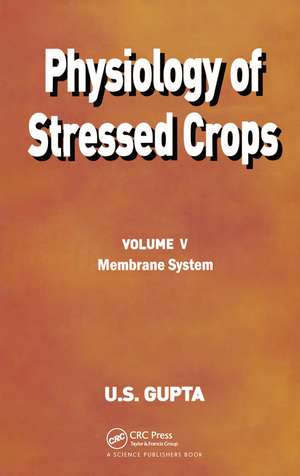Physiology of Stressed Crops, Vol. 5: Membrane System: Physiology of Stressed Crops
Autor U S Guptaen Limba Engleză Hardback – 9 ian 2007
Preț: 717.53 lei
Preț vechi: 957.31 lei
-25% Nou
Puncte Express: 1076
Preț estimativ în valută:
137.30€ • 143.35$ • 113.63£
137.30€ • 143.35$ • 113.63£
Comandă specială
Livrare economică 14-28 martie
Doresc să fiu notificat când acest titlu va fi disponibil:
Se trimite...
Preluare comenzi: 021 569.72.76
Specificații
ISBN-13: 9781578085217
ISBN-10: 1578085217
Pagini: 418
Dimensiuni: 152 x 229 x 25 mm
Greutate: 0.95 kg
Ediția:New.
Editura: CRC Press
Colecția CRC Press
Seria Physiology of Stressed Crops
ISBN-10: 1578085217
Pagini: 418
Dimensiuni: 152 x 229 x 25 mm
Greutate: 0.95 kg
Ediția:New.
Editura: CRC Press
Colecția CRC Press
Seria Physiology of Stressed Crops
Public țintă
Academic and PostgraduateCuprins
Membranes; Cold and Freezing; Heat Stress; Drought Stress; Salinity Stress; Hypoxic Stress; Oxidative Stress; UV-B Radiation Stress; Nutrient Deficiency Stress; Heavy Metal Toxicity Stress; Soil Acidity Stress; Mechanical Stress and Wounding; Low Humidity Stress
Descriere
Though plant cells are separated by cell walls, cells maintain their identity as they are delimited by semi-permeable membranes that permit them to function as autonomous units. The flow of materials in and out of the cell is regulated by channels, transporters, pumps, and acquaporins in these membranes. The cytoplasm is sandwiched between two membranes: the plasma membrane, which forms the outer boundary of the cytoplasm, and the tonoplast or the vacuolar membrane which forms the inner boundary. Cell membranes serve several different functions: form boundaries and provide compartmentalization, site of chemical reactions catalyzed by membrane proteins, regulate the exchange of ions/compounds across the barrier, site of perception/transmission of signals (hormones), and act in cell-to-cell communication.The membrane functions are affected by different abiotic (biotic stress not discussed), nutritional, edaphic and mechanical stresses, which have been discussed in this volume in light of the recent literature


